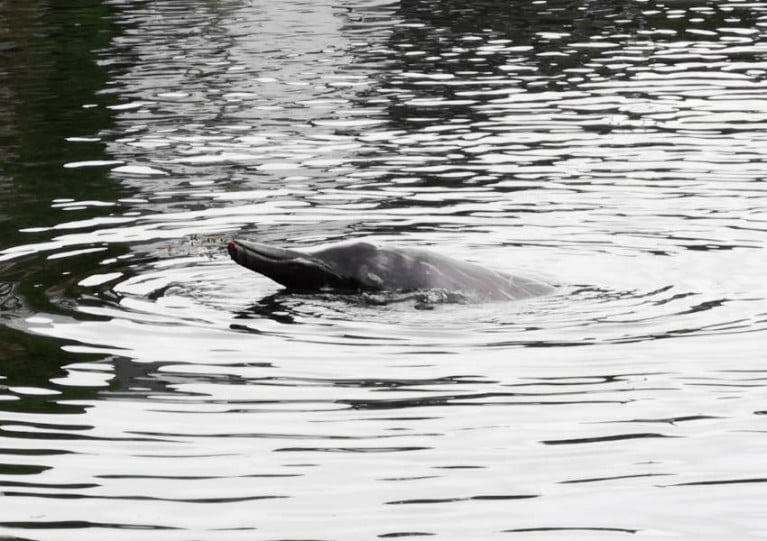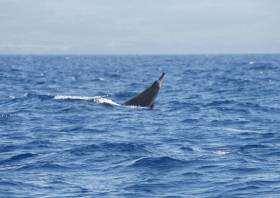Displaying items by tag: Sowerby's beaked whale
A local community in eastern Co Mayo rallied to attempt to save as many as 13 common dolphins that live-stranded near Blacksod on Friday (13 August).
As Mayo IWDG’s Facebook reports, the family group comprising 13 dolphins — mainly mothers and calves with a large male — stranded at Tarmon Beach with the tide dropping.
Sadly three of the dolphins died before they could be helped, but the rest responded to being cooled with buckets of seawater by local volunteers assisting the area’s Irish Whale and Dolphin Group (IWDG) members.
As the tide was still dropping for over an hour, it was quickly decided to move the dolphins 2km by road to the slipway at Blacksod where they could be more easily immersed and cared for.
The local IWDG team used their new wheeled dolphin stretcher to transport the larger marine wildlife to a horse box, while the juveniles were carried in beach towels.
Once carefully released back into the water, all were seen to swim quickly and without obvious distress, and by 9pm the pod had left the area.
“Tarmon and the surrounding beaches on the east side of the Mullet Peninsula are notorious for common dolphins live-stranding due to the topography of the beaches,” Mayo IWDG said.
“The beaches are large flat expanses so during spring tides especially, the water can level can drop uniformly and recede up to 1km in parts. Common dolphins being an offshore dolphin species often get caught out on such difficult-to-navigate shallow terrain.
“When a dolphin live-strands it puts immense pressure on their bodies. They can become very disorientated and have muscle spasms from the stranding event making it difficult to swim, which is why this group were given recovery time at Blacksod before being released.
“Thanks again to everyone who helped out today; it was so humbling to see everyone work together to get this pod back to the sea.”
 Juvenile dolphins cooled down with wet towels and seaweed were given recovery time with their pod before release | Credit: Mayo IWDG/Facebook
Juvenile dolphins cooled down with wet towels and seaweed were given recovery time with their pod before release | Credit: Mayo IWDG/Facebook
Elsewhere, the IWDG reports on two separate strandings of Sowerby’s beaked whales in Co Galway. The first was found washed up on Inisbofin at the end of the week while the second was reported yesterday (Saturday 14 August) across the water in Cleggan.
Commenting on the former report, the IWDG said: “Beaked whales are not stranded that frequently but this individual had evidence of rope marks on its body.
“As [they are] an offshore deep-diving species we don’t expect beaked whales to get entangled in fishing gear or interact with offshore activity.
“Maybe these rope marks were not from fishing but some other source. Hard to tell, but without a full post-mortem examination the cause of death will remain speculative.”
Rarely Sighted Beaked Whale Dies In Wicklow Harbour
A Sowerby’s beaked whale — of a marine wildlife species rarely sighted in Irish waters — has died after getting into distress in Wicklow Harbour, as The Irish Times reports.
According to the Irish Whale and Dolphin Group (IWDG), the male whale stranded near Wicklow Sailing Club after losing its bearings yesterday morning, Saturday 4 July.
Sowerby’s beaked whales are one of four out of 22 beaked whale species known to be in Irish waters. They normally inhabit deep waters below 200 metres in the North Atlantic, and are rarely seen by humans.
“From the outset it appeared to be in poor health, appearing disorientated and having difficulty moving. Therefore, it would not have been a candidate for refloating,” the IWDG said in a statement on Facebook.
“Euthanasia is also extremely difficult in these circumstances due to the large size of the animal as well as public safety concerns.”
The whale will be recovered for a full post-mortem to try and “to find out more about the life of these rare and enigmatic whales”, said IWDG chief executive Dr Simon Berrow.
Ten months ago a Sowerby’s beaked whale stranded on a beach near Helvick Head in Co Waterford. While it was refloated twice by local lifeboat volunteers, it was thought unlikely to survive.
Concerns For Rare Beaked Whale Refloated From Waterford Beach
Concerns remain for the health of a rare beaked whale refloated from a Co Waterford beach at the weekend, as The Irish Times reports.
The Sowerby’s beaked whale stranded near Helvick Head on Friday (30 August) and was twice returned to the open sea by the local RNLI lifeboat crew.
The incident marks the fourth stranding this year around the coast — and the only live stranding — of a deep water marine wildlife species that’s historically been rare in Irish inshore waters, with only 25 confirmed since records began.
Its fate is currently unknown, but Irish Whale and Dolphin Group (IWDG) strandings officer Mick O’Connell suggests the situation doesn’t look good.
“Sowerbys usually live in much deeper water 300kms off the west coast — that makes me think it’s unlikely it will survive — it may be sick, but it’s got as good a chance to survive as it could because everything was done locally to get it back out to sea,” he said.
The Irish Times has more on the story HERE.






























































